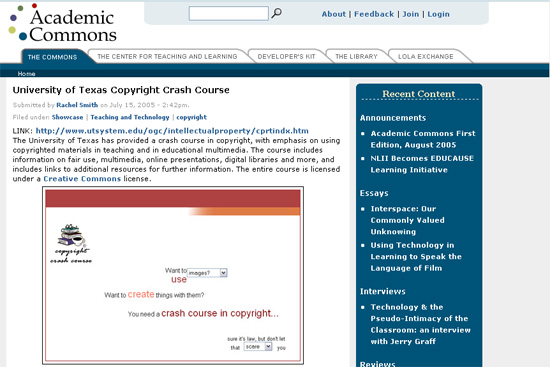A Technological “Academic Commons” for Liberal Arts Colleges
 |
| Academic Commons, a Web site developed by two Wesleyan staff members and a staff member from Alma College launched in August. |
| Posted 09/09/05 |
| Colleagues from liberal arts colleges interested in technology-related issues can read original articles on the topic, share their own ideas and even collaborate with their peers on a Web site launched this month called Academic Commons (http://www.academiccommons.org).
The site offers a forum for investigating and defining the role that technology can play in liberal arts education. The idea for the project came out of a series of meetings that took place at the Center of Inquiry in the Liberal Arts at Wabash College. Michael Roy, director of Academic Computing Services and Digital Projects, and John Ottenhoff of Alma College spearheaded the project. Jennifer Curran, functional project manager for Wesleyans EPortfolio, is the publications managing editor. Roy says the intent was to create a space where faculty, technologists, librarians and other stakeholders in the academic enterprise could think critically about the impact of technology on liberal education. There are many other venues for talking about technology and education more generally, and there are plenty of opportunities for technologists to talk with other technologists, and librarians with other librarians, and so forth, but we did not find any other space that looks at this particular niche, Roy says. Academic Commons publishes essays, reviews, interviews, showcases of innovative uses of technology and vignettes that critically examine technology uses in the classroom. The first edition features essays on copyright issues, using technology in learning to speak the language of film and the dangers of just-in-time education. The site offers links to a variety of interesting teaching, learning and technology projects. The Web site also has built-in collaboration software to encourage people to use the space to work together on projects. Roy and Curran foresee building a genuine community of like-minded people all working in this specialized territory. We are all wrestling with the complex and evolving relationships among technology, new media, and liberal arts education, Curran says. Technology challenges higher education professionals to think beyond conventional notions of the liberal arts and to broaden their understanding of what it means to be liberally educated. Our hope is that our counterparts at institutions of higher education across the country will find this space useful in their efforts to explore these ideas and to take an active part in shaping the relationship between technology and liberal arts education. |
| By Olivia Drake, The Wesleyan Connection editor |

